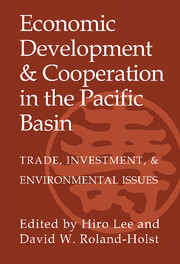 Economic Development and Cooperation in the Pacific Basin
Economic Development and Cooperation in the Pacific Basin Book contents
- Frontmatter
- Contents
- Acknowledgments
- List of Contributors
- I Introduction and Overview
- II U.S.-Japan and Asian Trade Patterns
- III Regional Trading Arrangements in the Pacific Basin
- IV Foreign Direct Investment: Determinants and Consequences
- V Trade, Resources, and the Environment
- 12 Economic Development and the Environment in China
- 13 Outward Orientation and the Environment in the Pacific Basin: Coordinated Trade and Environmental Policy Reform in Mexico
- Index
13 - Outward Orientation and the Environment in the Pacific Basin: Coordinated Trade and Environmental Policy Reform in Mexico
Published online by Cambridge University Press: 19 May 2010
- Frontmatter
- Contents
- Acknowledgments
- List of Contributors
- I Introduction and Overview
- II U.S.-Japan and Asian Trade Patterns
- III Regional Trading Arrangements in the Pacific Basin
- IV Foreign Direct Investment: Determinants and Consequences
- V Trade, Resources, and the Environment
- 12 Economic Development and the Environment in China
- 13 Outward Orientation and the Environment in the Pacific Basin: Coordinated Trade and Environmental Policy Reform in Mexico
- Index
Summary
INTRODUCTION
Economic growth and integration in the Pacific region have been remarkable, both in Asia and, less conspicuously, in Latin America (Mexico, Chile, and Costa Rica). At the same time, economic prosperity resulting from rapid growth has inspired doubts about its cost in terms of pollution and environmental degradation. As incomes rise rapidly, demand for a better environment and pollution abatement will inevitably increase. This chapter analyzes the interface between growth, world market integration, and the environment in Mexico. In particular, we examine how tradeoffs between growth and environmental objectives take place and can be minimized by using policies that coordinate taxes on pollution emissions with outward-oriented trade strategies.
In recent years, a resurgence of interest in trade and environment linkages has occurred in the context of multilateral agreements such as the Uruguay Round of the GATT/WTO and the NAFTA. Most of this new debate has been rhetorical rather than empirical. Recently, however, several rigorous essays have appeared that attempt to quantify the linkages between trade, growth, and the environment, especially in the context of economywide models of domestic pollution (for example, Grossman and Krueger, 1992; Lee and Roland-Hoist, 1997) and transboundary or multilateral pollution (for example, Perroni and Wigle, 1994; Whalley, 1991). These essays show that fears of extensive environmental degradation brought about by free trade are not generally substantiated by available evidence. Most essays find little interface between transboundary pollution and free trade. The link between trade and pollution appears to arise primarily from the expansion of aggregate output rather than new patterns of international specialization. Surely, this type of real output and income growth is the primary intention of most outward-oriented trade reforms.
- Type
- Chapter
- Information
- Economic Development and Cooperation in the Pacific BasinTrade, Investment, and Environmental Issues, pp. 446 - 472Publisher: Cambridge University PressPrint publication year: 1998


